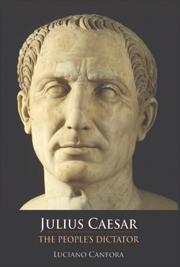Book contents
- Frontmatter
- Contents
- Translators' Note
- Acknowledgements
- Foreword
- PART I FROM SULLA TO CATILINE
- PART II FROM THE TRIUMVIRATE TO THE CONQUEST OF GAUL
- PART III THE LONG CIVIL WAR
- 16 Towards the Crisis
- 17 Striving after Tyranny?
- 18 Attacking the World with Five Cohorts
- 19 Caesar's ‘Programme’: In Search of Consensus
- 20 ‘Amicitia’
- 21 From the Rubicon to Pharsalus
- 22 Against Subversion
- 23 Alexandria
- 24 Caesar Saved by the Jews
- 25 From Syria to Zela
- 26 The Long Civil War
- 27 The Shoot of a Palm Tree: The Young Octavius Emerges
- 28 ‘Anticato’
- PART IV FROM THE CONSPIRACY TO THE TRIUMPH OF CAESARISM
- Chronology
- Bibliography
- Index
17 - Striving after Tyranny?
from PART III - THE LONG CIVIL WAR
Published online by Cambridge University Press: 05 August 2013
- Frontmatter
- Contents
- Translators' Note
- Acknowledgements
- Foreword
- PART I FROM SULLA TO CATILINE
- PART II FROM THE TRIUMVIRATE TO THE CONQUEST OF GAUL
- PART III THE LONG CIVIL WAR
- 16 Towards the Crisis
- 17 Striving after Tyranny?
- 18 Attacking the World with Five Cohorts
- 19 Caesar's ‘Programme’: In Search of Consensus
- 20 ‘Amicitia’
- 21 From the Rubicon to Pharsalus
- 22 Against Subversion
- 23 Alexandria
- 24 Caesar Saved by the Jews
- 25 From Syria to Zela
- 26 The Long Civil War
- 27 The Shoot of a Palm Tree: The Young Octavius Emerges
- 28 ‘Anticato’
- PART IV FROM THE CONSPIRACY TO THE TRIUMPH OF CAESARISM
- Chronology
- Bibliography
- Index
Summary
Sullam nescisse litteras, qui dictaturam deposuerit. [Sulla was ignorant when he renounced dictatorship.]
CaesarSuetonius rejected all other explanations, including the one ‘frequently repeated’ by Pompey, which was, however, rather unlikely. According to Pompey – and one would like to know Suetonius' source for this interesting information – Caesar could not complete what he had undertaken; that is, finish the monuments and public works he had begun and satisfy the expectations he had aroused in the people; therefore he took the path to revolution. If Pompey really did say this – Butler and Cary facetiously observe – it is clear that he understood nothing about his adversary's character. In reality, Pompey's remark was far less an attempt at analysis than a contemptuous judgement which reduced the figure of his opponent to the level of a party leader without prospects who was tormented by a pressing need for money, or rather, who was crushed by enterprises that were too great for him. This could describe ‘Catilinarian’ characters, and probably Clodius as well, but not an able career-builder like Caesar, who had derived an uncommon economic strength from the Gallic campaign. We do not know when Pompey made his polemical judgement (‘omnia permiscere voluisse’): certainly it does not fit Caesar's behaviour in 51–50 bc, which seems, on the contrary, obstinately bent on compromise.
- Type
- Chapter
- Information
- Julius CaesarThe People's Dictator, pp. 137 - 140Publisher: Edinburgh University PressPrint publication year: 2007



